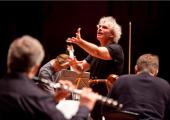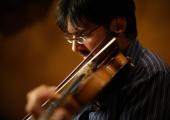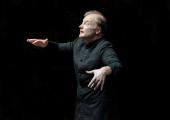Soloists of the Bavarian Radio Symphony Orchestra, Uchida, QEH



Paul Lewis doesn't smile much. He came to the keyboard last night with his face tuned to his usual blank-to-grim setting for the first recital in his Schubert cycle at the Wigmore Hall: a serious man with serious business. If only I could take his piano playing as seriously as he clearly thinks we should.

Anything anyone else can do, we can do better, seemed the mantra last night. It's probably a bit churlish to accuse the finest orchestra in the world of arrogance - surely that's their job? But the first night of the Berlin Philharmonic's four-day stay in London (yesterday, the Queen Elizabeth Hall, tonight and tomorrow, the Barbican), in which three of the four pieces required conductorless chamber ensembles, did seem decidedly show-offy.

No doubt about it, Leonidas Kavakos is one of the world's top 10 live-wire violinists. But here in London he seems to have sold himself a bit short recently with a less than great concerto repertoire (Korngold, Szymanowski's Second). Korngold furnished a springy intermezzo in last night's blockbuster recital, Szymanowski a ravishing second encore, but I went to hear two giddying masterpieces, Prokofiev's First Violin Sonata and Schubert's Fantasy in C. If unknown quantity Enrico Pace could manage to play Richter to Kavakos's David Oistrakh, it might turn out to be awe-inspiring. He did, so it was.

Born in 1945 to Russian parents in Tbilisi, Georgia, Elisabeth Leonskaja gave her first major recital at the age of 11 and went on to study at the Moscow Conservatory, emigrating from the Soviet Union to Vienna in 1978 and making a sensational Salzburg Festival debut a year later.

As we take in news of the cuts that the arts will have to absorb, and wait for the Cassandras to start hollering, it's important to remind ourselves of one arts venue that won't be wiping one bead of sweat off its brow as a result of today's announcements: the Wigmore Hall. This season, Britain's finest chamber music venue has a line-up of unsurpassed quality and variety. Yet it does so with less subsidy than any other equivalent music organisation in the country. Cuts in state subsidy do not end quality. They improve it.

Maybe it's a truism that most instrumental music, at least before World War One, aspires to the condition of song. Few have gone farther in that respect than the composers of the three purely orchestral works in last night's Prom. Add to the mix a conductor of impeccable operatic credentials who knows how to draw intimate vocalising from his players, a promising lyric-dramatic pianist and one of the most unusual great soprano voices of our time, and an evening of singing heartbreak was the result.

You want to see Yuri Bashmet, arguably the greatest living viola player, but you can't because you've chosen to go to a recital by Yevgeny Kissin, one of the world's top pianists, on the same evening in another hall. Even the option of dashing from one half to another is complicated by timing and distance. No, this isn't Berlin, London or Vienna. It's just a typical dilemma in the 17-day life of the Verbier Festival, high in the major Alps of Switzerland's Valais region.

Few great works of art are as disarming as Schubert’s Die Schöne Müllerin. With its folksong-like melodies and deceptively simple harmonic palate, it is quite hard to account for the cycle’s profound emotional effect. How is it that over the course of 20 songs we fall under the spell of a naïve and sentimental lover, a slightly effeminate, self-obsessed boy who, no sooner than he sees a rival, despairs and drowns himself?
